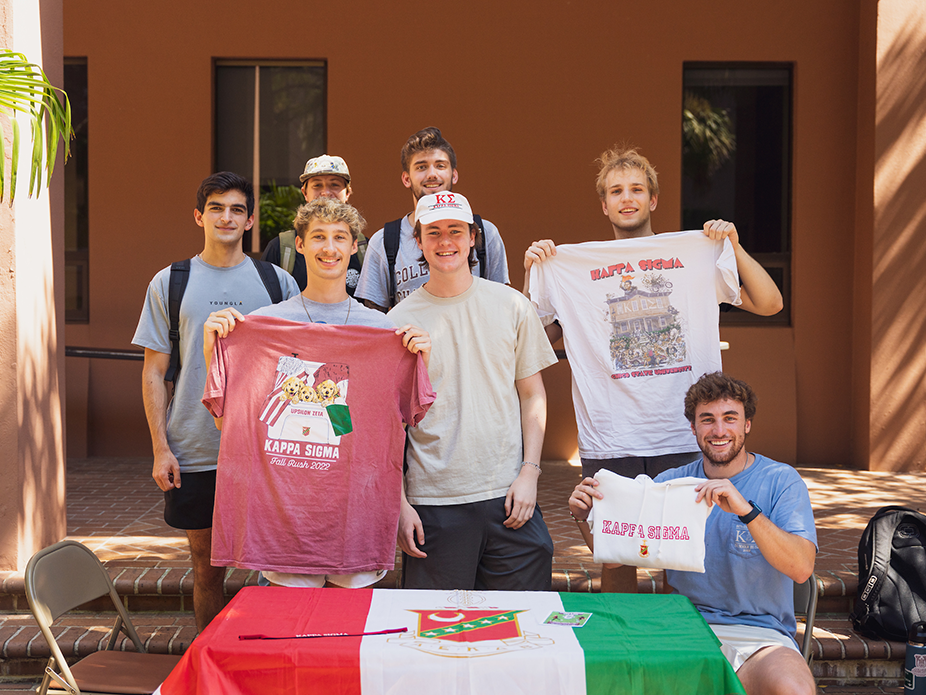Fraternity & Sorority Life
It's Convocation. The new, first-year students are looking toward their future - whatever that may mean. They walk under the arch at Porter’s Lodge to sign "the book."
It's spring. Commencement is over. The music swells. A new, graduating class walks under that same arch and out into the world.
Written in Greek above the central arch are the words Know Thyself.
While everyone appreciates the sentiment, it's the scholars and leaders of Fraternity & Sorority Life that get the most out of that Greek phrase.
Can you picture yourself as one of these scholars and leaders? If so, you should consider becoming a member of one of the Greek organizations on campus.
We have three governing councils:


Go Greek!
Members of the fraternity and sorority community participate in Pep Supper, one of the oldest traditions celebrated at the College dating back nearly 100 years.

Reasons to Join
-
SCHOLARSHIP
One of the major goals of fraternities and sororities is to encourage and assist you in your academic potential.
Each fraternity and sorority offers academic support programs, including:
- national and local scholarships and grants.
- incentives and awards.
- study skills workshops.
- tutoring programs.
- established study sessions.
- grade point requirements.
-
LEADERSHIP
When you join a fraternity or sorority, you'll have so many opportunities to develop your leadership potential.
Fraternities and sororities not only provide training in the principles of leadership, but they are also laboratories in which these principles can be tested. Each member is actively involved in decision-making processes, teaching and encouraging students to utilize their leadership talents in the chapters and on campus.
Greeks are leaders not only in their own organization, but also in many major campus organizations at the College.
-
SERVICE
Community service is an important aspect of membership within a sorority or fraternity.
Participation in community service builds character through the realization of the needs of others. Fraternities and sororities individually and collectively are involved in activities such as:
- tutoring children.
- organizing fund-raising events and competitions.
- sponsoring canned food drives.
- conducting community and beach clean-ups.
- a variety of other philanthropic activities.
-
FRIENDSHIP
For many individuals, the most important component of fraternity and sorority life is lifelong friendships. The fact that members call themselves "sister" and "brother" demonstrates the sense of family that the groups provide.
In this often overwhelming university environment, you may find that a sorority or fraternity offers you a place to be comfortable and feel at home.
Interested in Joining?
NPHC & Culturally Based Organizations: Membership Intake Process
The NPHC and Culturally-Based organizations select their members through a membership intake process. Joining an NPHC or culturally-based fraternity or sorority is possible when members decide they have enough interest from qualified students to take a new member class.
This process may occur in either the fall or spring semester, or both. It depends on the individual organization. Each chapter coordinates its own process and events are held separately. To begin the intake process, groups host meetings on campus. A great way to learn about local chapters is by attending programs they sponsor. These meetings and programs will be advertised around campus and on our website calendar.
IFC & Panhellenic: Formal Recruitment Process
IFC fraternities and Panhellenic sororities select their members through a structured recruitment process, often referred to as “formal recruitment.” The IFC and Panhellenic organizations at the College of Charleston have both formal and informal recruitment processes.
Formal recruitment for IFC fraternities occurs at the beginning of both the fall and spring semesters.
Panhellenic Sororities conduct their formal recruitment process in the fall semester with some chapters also conducting informal recruitment in the spring semester (some panhellenic chapters may choose not to participate in informal spring recruitment).
Our Greek Communities
We offer twenty-four nationally affiliated chapters.
Culturally-Based Organizations
Interfraternity Council (IFC)
The Interfraternity Council is one of three FSL councils present at College of Charleston and serves as the governing body for the 8 nationally recognized IFC men's fraternities on campus.
- Alpha Tau Omega
- Delta Tau Delta
- Kappa Alpha Order
- Kappa Sigma
- Phi Gamma Delta
- Pi Kappa Phi
- Sigma Chi
- Sigma Nu
National Pan-Hellenic Council (NPHC)
The National Pan-Hellenic Council is one of three FSL councils present at College of Charleston and serves as the governing body for the nine nationally recognized NPHC organizations (i.e. The Divine Nine). There are currently eight of the nine NPHC organizations recognized at College of Charleston. Four are fraternities and four are sororities.
- Alpha Phi Alpha Fraternity Inc.
- Alpha Kappa Alpha Sorority, Inc.
- Kappa Alpha Psi Fraternity, Inc.
- Omega Psi Phi Fraternity, Inc.
- Delta Sigma Theta Sorority, Inc.
- Phi Beta Sigma Fraternity, Inc.
- Zeta Phi Beta Sorority, Inc.
- Sigma Gamma Rho Sorority, Inc.
Panhellenic Association (Panhellenic)
The Panhellenic Association is one of three FSL councils present at College of Charleston and serves as the governing body for the eight nationally recognized women's organizations at the College.
Learn about CofC Panhellenic.
FAQ
-
How to join a fraternity or sorority
Requirements and procedures are different for each of our councils (IFC, Panhellenic and NPHC).
As a general guideline, when you get involved in campus activities, you will meet members of the Greek community. Let them know you are interested in learning more about the Greek community and they should direct you to the appropriate next step.
You can always contact the Office of Fraternity and Sorority Life to learn more about the opportunities and avenues to be recruited.
-
How will my grades be impacted by fraternity or sorority membership?
Sororities and fraternities serve as a great resource for students academically. They often help with study hours, tutoring programs and time management.
Most chapters require a high GPA both for initial membership into the organization and to remain an active member.
The minimum GPA to participate in Greek recruitment in an IFC or Panhellenic group is 2.5.
NPHC groups require a GPA of 2.5 and 12-15 hours of college credit depending on the individual group.
Typically, the grade point average for Greek organizations meets the campus grade point average and our new member averages are significantly higher than the respective first-year men’s and women’s average.
Students need to be reminded that they are in college for academics first and a social life second. The Greeks know the difference by making scholarship a priority.
-
Will I have time for a fraternity or sorority?
In most cases, a new fraternity or sorority member will have the following meetings per week:
- one chapter meeting.
- one new member meeting during their first semester.
- one committee meeting.
- optional social events.
Community service activities, recruitment events and chapter leadership retreats are examples of other activities that Greeks take part in.
Greek students learn quickly how to manage their busy schedules, which will help them scholastically and as they move into the workforce. The more time members spend with their fraternity brothers or sorority sisters at chapter activities, the more they will get out of their Greek experience.
-
Does it cost a lot of money to join?
Like any opportunity for involvement in college, there is a financial commitment associated with joining a fraternity or sorority. The costs go toward international and/or national fees, chapter operating expenses and social functions.
Financial obligations differ for men and women and among individual chapters.
New members can expect to pay higher dues their first semester.
Dues range from $500-$1,000 per semester for IFC men and Panhellenic women and $70-$400 per semester for NPHC men and women.
Additional costs throughout the semester may be for pictures, gifts, T-shirts and other organization’s philanthropic activities, etc.
There are payment plans available for students, as well as scholarships within the individual chapters.
-
Does hazing still exist as part of the new member process?
The College of Charleston, as well as each national fraternity and sorority, has a zero-tolerance policy regarding hazing that is consistent with South Carolina state law.
Hazing includes any activity that subjects members to harassment, ridicule, intimidation, physical exhaustion, abuse or mental distress. Hazing is contrary to the purposes of the Greek community and the College of Charleston. Hazing is not tolerated.
If you feel that you or someone you know is participating in inappropriate activities as a result of membership in a fraternity or sorority, you should submit a anonymous RealResponse Report by texting the number 231-462-5933.




